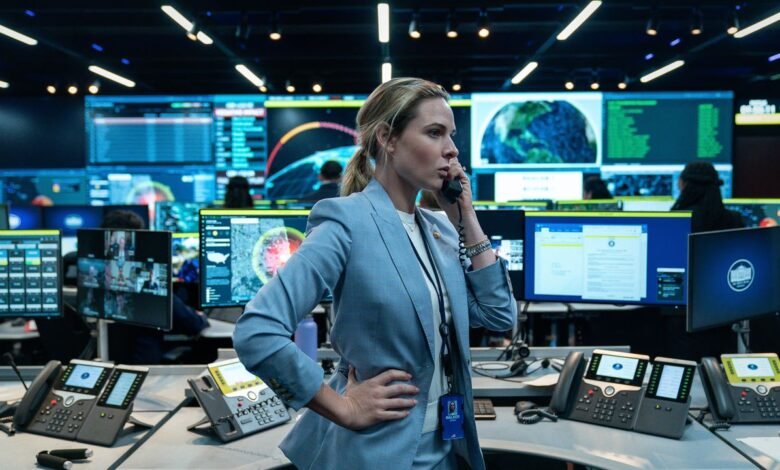
Little of this plays to Bigelow’s strengths. She has directed at least one screw-tightening nuclear-crisis movie before, the Soviet-submarine thriller “K-19: The Widowmaker” (2002). But, at her best, she has a gift for making the passage of time feel loose, hypnotic, and poetically indeterminate, not artificially manipulated and pressurized. She’s a master at subtly fleshing out the inner lives of real people doing their jobs under real working conditions. That’s not the kind of thing you can achieve with this sort of brisk and superficial “24” cosplay, no matter how much immaculate D.C. production design it comes packaged with. Even as a title, “A House of Dynamite” is an eye-roller—a windy mouthful of metaphor, especially from a director whose previous film titles have often shown a flair for tersely evocative language (“Near Dark,” “Strange Days,” “Point Break”).
Bigelow has often been accused of being apolitical—or, because of her fascination with the codes, rites, and aesthetics of men at war, of advancing a gung-ho fetishization of American militarism. In the wider-ranging bureaucratic panorama of “A House of Dynamite,” she offers up such a pessimistic view of a U.S. disaster response, even with a more functional and competent government than the one we have at present, that it’s hard to read any of it as propagandistic—or, for that matter, politically specific. (Certain character details suggest a grab bag of bipartisan associations: a woman briefing the White House press corps is a dead ringer for Jen Psaki, former President Joe Biden’s first press secretary. Elba’s President is doing a photo op with young basketball players when disaster strikes—a kinder version of the moment when President George W. Bush first received word of the September 11th attacks, during a Florida elementary-school reading of “The Pet Goat.”)
In another crucial respect, “A House of Dynamite” feels like a decisive break with Bigelow’s recent work. Her previous two films were both slammed for their uses and representations of violence: “Zero Dark Thirty” was accused of bending scenes of torture into a defense of torture, and “Detroit” (2017), an underappreciated drama set during the civil-rights era, was criticized for exploiting the very horrors that it sought to condemn. By contrast, “A House of Dynamite” is devoid of onscreen bloodshed, all the way up to its muted conclusion. I counted one death—an unexpectedly hilarious one—but the looming mass slaughter remains an offscreen abstraction, and perhaps even a badge of artistic restraint.
Why, then, does it feel more like a failure of nerve? I’m not suggesting that Bigelow should have depicted the destruction of a major metropolitan city and its human population; we have Roland Emmerich for that. But a large-scale disaster epic might actually have unnerved us more effectively than this wonky chamber exercise and whatever it thinks it’s doing. Like last year’s middling “September 5,” which half dramatized the terrorist attacks at the 1972 Munich Olympics from the vantage of an ABC Sports crew, “A House of Dynamite” inadvertently suggests that, as a movie genre, the control-room thriller may be approaching its limitations, with clichés, evasions, and stagy tricks as formulaic as those of any blockbuster.
As it happens, there was a blockbuster earlier this year that, with no pretense to realism, conjured a frightening warning of imminent nuclear disaster. “Mission: Impossible—The Final Reckoning” wasn’t an especially satisfying movie, but it did feature a prickly, thoughtful war-room debate over what preëmptive action, if any, the President should take, in the chilling event of a superpowered A.I. villain seizing control of the world’s nuclear arsenals. In its own outlandish way, the film captured the sum of all fears that “A House of Dynamite” is trying to get at: the horrors of unchecked proliferation, the uncertainties of how enemies and allies alike would respond, and the mounting likelihood of global catastrophe. Exactly how plausible any of it was, I have no idea; the point was that it felt plausible, because the director and co-writer Christopher McQuarrie willed it, with unapologetic movie-movie verve, into the stuff of vividly imagined fiction. Bigelow and Oppenheim seem eager to make something far more than mere entertainment and, as a consequence, wind up with something conspicuously less. ♦



